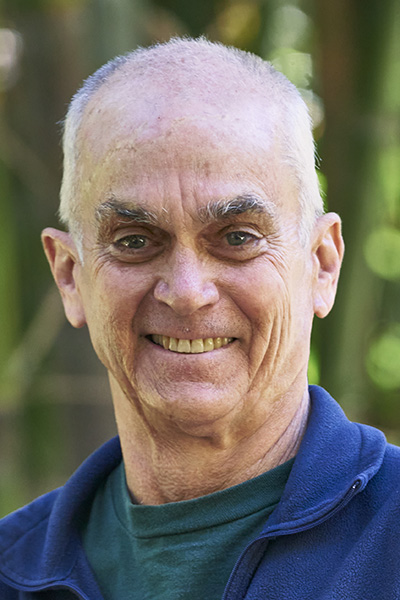H. Bradley Shaffer
Distinguished Professor
Director, UCLA La Kretz Center for California Conservation Science

brad.shaffer@ucla.edu
310-825-3836
4163 Terasaki Life Sciences Building (TLSB)
lab website
Research Areas
Conservation Biology, Ecology, Evolutionary Biology
Research Interests
Evolutionary biology, ecology and conservation biology, primarily of amphibians and reptiles. My most recent research projects have focused on conservation genomics, both in California and more broadly. I am the Principal Investigator and Director of the California Conservation Genomics Project (CCGP), an analysis of 250 species of plants and animals that uses the power of genomic analysis to help conserve our state’s biodiversity. In other projects, we recently completed a phylogenetic analysis of virtually all of the world’s turtles and tortoises, providing an evolutionary framework that is essential for the conservation of this diverse, extremely endangered group of reptiles. We continue to focus a great deal of ecological and genetical work on the California tiger salamander, an endangered species native to central California grassland habitat, as well as several other endangered frogs, toads, and salamanders.
In addition to my appointment in the Department of Ecology and Evolutionary Biology, I am the Director of the La Kretz Center for California Conservation Science, a research center in the UCLA Institute of the Environment and Sustainability (IoES). I also am Director of the UCLA Stunt Ranch Reserve, one of UCLA’s two reserves in the UC Natural Reserve System (NRS), and am the campus liaison to the NRS.
Selected Publications
Cooper, R. D. and H. B. Shaffer. 2023. Managing invasive hybrids using pond hydroperiod in an endangered salamander system. Conservation Biology, e14167 https://doi.org/10.1111/cobi.14167
Beninde, J., T. W. Delaney, G. Gonzalez, and H. B. Shaffer. 2023. Harnessing iNaturalist to quantify hotspots of urban biodiversity: the Los Angeles case study. 2023. Frontiers in Ecology and Evolution. 11:983371. doi: 10.3389/fevo.2023.983371
Richmond, J. Q., J. A. McGuire, M. Escalona, M. P.A. Marimuthu, O. Nguyen, S. Sacco, E. Beraut, E. Toffelmier, R. N. Fisher, I. J. Wang, and H. B. Shaffer. 2023. Reference genome of an iconic lizard in western North America, Blainville’s horned lizard Phrynosoma blainvillii. Journal of Heredity 114:410-417. https://doi.org/10.1093/jhered/esad032
Messerman, A. F., A. G. Clause, L. N. Gray, M. Krkosˇek,, H. B. Rollins, P. C. Trenham, H. B. Shaffer* and C. A. Searcy*. 2022. Applying stochastic and Bayesian integral projection modeling to amphibian population viability analysis. Ecological Applications pages 1-16, e2783, https://doi.org/10.1002/eap.2783 * = co-senior authors
Shaffer, H. B., E. Toffelmier, R. B. Corbett-Detig, M. Escalona, B. Erickson, P. Fiedler, M. Gold, R. J. Harrigan, S. Hodges, T. K. Luckau, C. Miller, D. R. Oliveira, K. E. Shaffer, B. Shapiro, V. L. Sork, and I. J. Wang. 2022. Landscape genomics to enable conservation actions: The California Conservation Genomics Project. Journal of Heredity 113:577-588; DOI: 10.1093/jhered/esac020 (Note: Selected as Editor’s Choice, including cover image; based on this article, the Editor in Chief decided to dedicate an entire issue, #6, to the CCGP.)
Fiedler, P. L., B. Erickson, M. Esgro, M. Gold, J. M. Hull, J. Norris, B. Shapiro, M. Westphal, E. Toffelmier, and H. B. Shaffer. 2022. Seizing the Moment: The opportunity and relevance of the California Conservation Genomics Project to state and federal conservation policy. Journal of Heredity 113:589-596.
Beninde, J., E. M. Toffelmier, A. Andreas, C. Nishioka, M. Slay, A. Soto, J. P. Bueno, G. Gonzalez, H. V. Pham, M. Posta, J. L. Pace, and H. B. Shaffer. 2022. CaliPopGen: A genetic and life history database for the fauna and flora of California. Scientific Data, 9(1):1-12. https://doi.org/10.1038/s41597-022-01479-z
Manzo, S., E. G. Nicholson, Z. Devereux, R. N. Fisher, C. W. Brown, P. A. Scott, and H. B. Shaffer. 2021. Conservation of northwestern and southwestern pond turtles: Threats, population size estimates, and population viability analysis. Journal of Fish and Wildlife Management, 12(2):485–501; e1944-687X. https://doi.org/10.3996/JFWM-20-094
Turtle Taxonomy Working Group [A.G.J. Rhodin, J.B. Iverson, R. Bour, U. Fritz, A. Georges, H.B. Shaffer, and P.P. van Dijk]. 2021. Turtles of the World: Annotated Checklist and Atlas of Taxonomy, Synonymy, Distribution, and Conservation Status (9th Ed.). In: Rhodin, A.G.J., Iverson, J.B., van Dijk, P.P., Stanford, C.B., Goode, E.V., Buhlmann, K.A., and Mittermeier, R.A. (Eds.). Conservation Biology of Freshwater Turtles and Tortoises: A Compilation Project of the IUCN/SSC Tortoise and Freshwater Turtle Specialist Group. Chelonian Research Monographs 8:1–472. doi: 10.3854/crm.8.checklist.atlas.v9.2021. (Also listed under books)
Thomson, R. C., P. Q. Spinks, and H. B. Shaffer. 2021. A global phylogeny of turtles reveals a burst of climate-associated diversification on continental margins. Proceedings of the National Academy of Sciences, USA, 118: 1-10 (No. 7 e2012215118)
Scott, P. A., L. J. Allison, K. J. Field, R. C. Averill-Murray, and H. B. Shaffer. 2020. Individual heterozygosity predicts translocation success in threatened desert tortoises. Science 370: 1086-1089.
